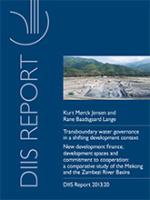DIIS Policy Brief
Transboundary water governance in a shifting development context
A comparative study of the Mekong and Zambezi River Basins
The global development context is shifting. The BRICS and other emerging economies increasingly provide investments and trade opportunities for developing countries with abundant natural resources. The Mekong and the Zambezi regions are at the center of these global transformations. Governments in the two regions embrace economic growth strategies fuelled by capitalization of natural resources. The water resources of the Mekong and Zambezi rivers are a key resource for national economic growth.
The increase in private investments provides unprecedented economic growth opportunities for the least developed countries in the regions, such as Laos in the Mekong and Mozambique in the Zambezi. In a ten-year scenario, the outcome of this development may be borderline industrial revolutions. More investments empower countries to make more sovereign development decisions. Their space for development expands and their political confidence is strengthened. A stronger sense of national sovereignty is emerging.
The authors of this DIIS Report analyze the consequences of this development for transboundary water governance arrangements in the two river basins. The focus is not only on the established river basin organizations - the Mekong River Commission and the Zambezi Watercourse Commission - but also on other bilateral cooperation arrangements based on investments in water resources, particularly hydropower. The authors conclude that there is a polycentric water governance reality in the two river basins reflecting different development agendas
River basin organizations are challenged by a strong sense of national sovereignty as well as this polycentric water governance reality. In the Mekong, governments proceed with hydropower projects in the face of criticism from downstream riparian countries and NGOs. Geo-political legacies exacerbate these hydro-political tensions. The authors analyze the bumpy road ahead for the two river basins organizations. The older Mekong River Commission is particularly under pressure to perform as development is accelerating in the region. The Zambezi Watercourse Commission is still young and may benefit from lessons in the Mekong
The authors conclude the report with a series of strategic recommendations to increase national commitment to the river basin organizations and enable them to play an operational role in transboundary water management.
The increase in private investments provides unprecedented economic growth opportunities for the least developed countries in the regions, such as Laos in the Mekong and Mozambique in the Zambezi. In a ten-year scenario, the outcome of this development may be borderline industrial revolutions. More investments empower countries to make more sovereign development decisions. Their space for development expands and their political confidence is strengthened. A stronger sense of national sovereignty is emerging.
The authors of this DIIS Report analyze the consequences of this development for transboundary water governance arrangements in the two river basins. The focus is not only on the established river basin organizations - the Mekong River Commission and the Zambezi Watercourse Commission - but also on other bilateral cooperation arrangements based on investments in water resources, particularly hydropower. The authors conclude that there is a polycentric water governance reality in the two river basins reflecting different development agendas
River basin organizations are challenged by a strong sense of national sovereignty as well as this polycentric water governance reality. In the Mekong, governments proceed with hydropower projects in the face of criticism from downstream riparian countries and NGOs. Geo-political legacies exacerbate these hydro-political tensions. The authors analyze the bumpy road ahead for the two river basins organizations. The older Mekong River Commission is particularly under pressure to perform as development is accelerating in the region. The Zambezi Watercourse Commission is still young and may benefit from lessons in the Mekong
The authors conclude the report with a series of strategic recommendations to increase national commitment to the river basin organizations and enable them to play an operational role in transboundary water management.
Topics

Staying afloat
river basin organizations in transboundary waters
